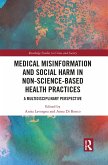Routledge Handbook of Intoxicants and Intoxication
Herausgeber: Hunt, Geoffrey; Asmussen Frank, Vibeke; Antin, Tamar
Routledge Handbook of Intoxicants and Intoxication
Herausgeber: Hunt, Geoffrey; Asmussen Frank, Vibeke; Antin, Tamar
- Broschiertes Buch
- Merkliste
- Auf die Merkliste
- Bewerten Bewerten
- Teilen
- Produkt teilen
- Produkterinnerung
- Produkterinnerung
Bringing together scholars from different disciplines in the humanities and social sciences, this multidisciplinary Handbook offers a comprehensive critical overview of intoxicants and intoxication.
Andere Kunden interessierten sich auch für
![Counselling Ideologies Counselling Ideologies]() Counselling Ideologies77,99 €
Counselling Ideologies77,99 €![Critical Intersex Critical Intersex]() Critical Intersex37,99 €
Critical Intersex37,99 €![The Routledge Handbook of Social Care Work Around the World The Routledge Handbook of Social Care Work Around the World]() Karen ChristensenThe Routledge Handbook of Social Care Work Around the World69,99 €
Karen ChristensenThe Routledge Handbook of Social Care Work Around the World69,99 €![Medical Misinformation and Social Harm in Non-Science Based Health Practices Medical Misinformation and Social Harm in Non-Science Based Health Practices]() Medical Misinformation and Social Harm in Non-Science Based Health Practices66,99 €
Medical Misinformation and Social Harm in Non-Science Based Health Practices66,99 €![Gendered Epidemic Gendered Epidemic]() Katie Hogan / Nancy L. Roth (eds.)Gendered Epidemic32,99 €
Katie Hogan / Nancy L. Roth (eds.)Gendered Epidemic32,99 €![Cosmetic Surgery Cosmetic Surgery]() Cressida J HeyesCosmetic Surgery76,99 €
Cressida J HeyesCosmetic Surgery76,99 €![The History of Gay People in Alcoholics Anonymous The History of Gay People in Alcoholics Anonymous]() Audrey BordenThe History of Gay People in Alcoholics Anonymous68,99 €
Audrey BordenThe History of Gay People in Alcoholics Anonymous68,99 €-
-
-
Bringing together scholars from different disciplines in the humanities and social sciences, this multidisciplinary Handbook offers a comprehensive critical overview of intoxicants and intoxication.
Hinweis: Dieser Artikel kann nur an eine deutsche Lieferadresse ausgeliefert werden.
Hinweis: Dieser Artikel kann nur an eine deutsche Lieferadresse ausgeliefert werden.
Produktdetails
- Produktdetails
- Verlag: Routledge
- Seitenzahl: 642
- Erscheinungstermin: 27. Mai 2024
- Englisch
- Abmessung: 246mm x 174mm x 34mm
- Gewicht: 1125g
- ISBN-13: 9781032321486
- ISBN-10: 1032321482
- Artikelnr.: 70337440
- Herstellerkennzeichnung
- Produktsicherheitsverantwortliche/r
- Europaallee 1
- 36244 Bad Hersfeld
- gpsr@libri.de
- Verlag: Routledge
- Seitenzahl: 642
- Erscheinungstermin: 27. Mai 2024
- Englisch
- Abmessung: 246mm x 174mm x 34mm
- Gewicht: 1125g
- ISBN-13: 9781032321486
- ISBN-10: 1032321482
- Artikelnr.: 70337440
- Herstellerkennzeichnung
- Produktsicherheitsverantwortliche/r
- Europaallee 1
- 36244 Bad Hersfeld
- gpsr@libri.de
Geoffrey Hunt is a Professor at the Centre for Alcohol and Drugs Research at Aarhus University, Denmark, and Director of the Institute for Scientific Analysis in San Francisco, USA. Tamar M.J. Antin is the Founder and Director of the Center for Critical Public Health and a Senior Research Scientist at the Institute for Scientific Analysis in San Francisco, USA. Vibeke Asmussen Frank is a Professor at the Centre for Alcohol and Drug Research at Aarhus University, Denmark.
Introduction Theme I: The meanings of intoxicants 1. Intoxications and
their meanings 2. Nic'd up: a practice theory approach to understanding
vaping nicotine as intoxication 3. Recreational drug use as everyday life:
explorations of young adults' gendered motivations for taking drugs in
Nigeria 4. When the clock takes over: hangovers in twentieth-century
British and American fiction and poetry Theme II: Social life of
intoxicants 5. Intoxicating consumption: capitalism and the commodification
of pleasure 6. Producing planned hedonism among opiate users in an online
drug market 7. Craft drinks, connoisseurship and intoxication 8. Ecstasy: a
synthetic history of MDMA Theme III: Intoxicating settings 9. The social
work of coffee: coffee consumption in Bosnia and Herzegovina and the
Bosnian diaspora 10. Expanding intoxication: what can drinking places
(c.1850-1950) tell us about other intoxicants and other sites? 11. Join us
for drinks: intoxication, work and academic conferences 12. Exploring the
motivations and social organisation of intoxication in prison settings 13.
How methadone becomes an intoxicant: the making of methadone within prisons
in the Kyrgyz Republic 14. Trades-offs between intoxication, safety, and
sociability within a drug-consumption facility 15. Intoxicants in warfare
Theme IV: Intoxication practices 16. Engaging with drug, set, and setting
to understand nicotine use experiences and practices 17. 'Uninhibited
play': the political and pragmatic dimensions of intoxication within queer
cultures 18. Ritual to reflexivity - from promotion and problematisation of
intoxication to proportionality Theme V: Alternative approaches for
studying intoxication 19. Intoxication made visible: the sober sciences of
intoxication, euphoria, and overdose in the laboratory 20. Trip reports:
exploring the experience of psychedelic intoxication 21. Passion, reason
and the politics of intoxication: ontopolitically-oriented approaches to
alcohol and other drug intoxication Theme VI: Scapegoated substances 22.
Alcohol, slavery and race in Brazil during the long nineteenth century 23.
Street-level policing, structural violence and habitus: accounts of
street-involved cannabis users in Nigeria 24. Ethnified intoxication - khat
use and the Somali community in Sweden 25. Symbolic meaning of the
amphetamine-type stimulant problem throughout the restoration of Japanese
society after WWII: drug control and the construction of the other Theme
VII: Discourses shaping intoxication and people who use intoxicants 26.
Risk, intoxication and death: contemporary media framing of drug-related
deaths 27. Clearing the air: toxic healthism and cigarette(s) (smoke) as
(in)toxicant(s) 28. Fighting intoxication and addiction: international drug
control as a self-perpetuating social system 29. Handling complexity:
constituting the relationship between intoxication and violence in
Australian alcohol policy discourse Theme VIII: Notions of excess 30.
Altered states: changing conditions of excess in European drinking cultures
31. From 'pledge' to 'public health': medical responses to Ireland's
drinking culture, c. 1890-2018 32. 'Drinking himself to death': the chronic
drunkard in British mid-Victorian fiction and culture 33. Tea, addiction
and late-Victorian narratives of degeneration, c.1860-1900 34. Conceiving
addiction: historical constructions of chronic intoxicant use
their meanings 2. Nic'd up: a practice theory approach to understanding
vaping nicotine as intoxication 3. Recreational drug use as everyday life:
explorations of young adults' gendered motivations for taking drugs in
Nigeria 4. When the clock takes over: hangovers in twentieth-century
British and American fiction and poetry Theme II: Social life of
intoxicants 5. Intoxicating consumption: capitalism and the commodification
of pleasure 6. Producing planned hedonism among opiate users in an online
drug market 7. Craft drinks, connoisseurship and intoxication 8. Ecstasy: a
synthetic history of MDMA Theme III: Intoxicating settings 9. The social
work of coffee: coffee consumption in Bosnia and Herzegovina and the
Bosnian diaspora 10. Expanding intoxication: what can drinking places
(c.1850-1950) tell us about other intoxicants and other sites? 11. Join us
for drinks: intoxication, work and academic conferences 12. Exploring the
motivations and social organisation of intoxication in prison settings 13.
How methadone becomes an intoxicant: the making of methadone within prisons
in the Kyrgyz Republic 14. Trades-offs between intoxication, safety, and
sociability within a drug-consumption facility 15. Intoxicants in warfare
Theme IV: Intoxication practices 16. Engaging with drug, set, and setting
to understand nicotine use experiences and practices 17. 'Uninhibited
play': the political and pragmatic dimensions of intoxication within queer
cultures 18. Ritual to reflexivity - from promotion and problematisation of
intoxication to proportionality Theme V: Alternative approaches for
studying intoxication 19. Intoxication made visible: the sober sciences of
intoxication, euphoria, and overdose in the laboratory 20. Trip reports:
exploring the experience of psychedelic intoxication 21. Passion, reason
and the politics of intoxication: ontopolitically-oriented approaches to
alcohol and other drug intoxication Theme VI: Scapegoated substances 22.
Alcohol, slavery and race in Brazil during the long nineteenth century 23.
Street-level policing, structural violence and habitus: accounts of
street-involved cannabis users in Nigeria 24. Ethnified intoxication - khat
use and the Somali community in Sweden 25. Symbolic meaning of the
amphetamine-type stimulant problem throughout the restoration of Japanese
society after WWII: drug control and the construction of the other Theme
VII: Discourses shaping intoxication and people who use intoxicants 26.
Risk, intoxication and death: contemporary media framing of drug-related
deaths 27. Clearing the air: toxic healthism and cigarette(s) (smoke) as
(in)toxicant(s) 28. Fighting intoxication and addiction: international drug
control as a self-perpetuating social system 29. Handling complexity:
constituting the relationship between intoxication and violence in
Australian alcohol policy discourse Theme VIII: Notions of excess 30.
Altered states: changing conditions of excess in European drinking cultures
31. From 'pledge' to 'public health': medical responses to Ireland's
drinking culture, c. 1890-2018 32. 'Drinking himself to death': the chronic
drunkard in British mid-Victorian fiction and culture 33. Tea, addiction
and late-Victorian narratives of degeneration, c.1860-1900 34. Conceiving
addiction: historical constructions of chronic intoxicant use
Introduction Theme I: The meanings of intoxicants 1. Intoxications and
their meanings 2. Nic'd up: a practice theory approach to understanding
vaping nicotine as intoxication 3. Recreational drug use as everyday life:
explorations of young adults' gendered motivations for taking drugs in
Nigeria 4. When the clock takes over: hangovers in twentieth-century
British and American fiction and poetry Theme II: Social life of
intoxicants 5. Intoxicating consumption: capitalism and the commodification
of pleasure 6. Producing planned hedonism among opiate users in an online
drug market 7. Craft drinks, connoisseurship and intoxication 8. Ecstasy: a
synthetic history of MDMA Theme III: Intoxicating settings 9. The social
work of coffee: coffee consumption in Bosnia and Herzegovina and the
Bosnian diaspora 10. Expanding intoxication: what can drinking places
(c.1850-1950) tell us about other intoxicants and other sites? 11. Join us
for drinks: intoxication, work and academic conferences 12. Exploring the
motivations and social organisation of intoxication in prison settings 13.
How methadone becomes an intoxicant: the making of methadone within prisons
in the Kyrgyz Republic 14. Trades-offs between intoxication, safety, and
sociability within a drug-consumption facility 15. Intoxicants in warfare
Theme IV: Intoxication practices 16. Engaging with drug, set, and setting
to understand nicotine use experiences and practices 17. 'Uninhibited
play': the political and pragmatic dimensions of intoxication within queer
cultures 18. Ritual to reflexivity - from promotion and problematisation of
intoxication to proportionality Theme V: Alternative approaches for
studying intoxication 19. Intoxication made visible: the sober sciences of
intoxication, euphoria, and overdose in the laboratory 20. Trip reports:
exploring the experience of psychedelic intoxication 21. Passion, reason
and the politics of intoxication: ontopolitically-oriented approaches to
alcohol and other drug intoxication Theme VI: Scapegoated substances 22.
Alcohol, slavery and race in Brazil during the long nineteenth century 23.
Street-level policing, structural violence and habitus: accounts of
street-involved cannabis users in Nigeria 24. Ethnified intoxication - khat
use and the Somali community in Sweden 25. Symbolic meaning of the
amphetamine-type stimulant problem throughout the restoration of Japanese
society after WWII: drug control and the construction of the other Theme
VII: Discourses shaping intoxication and people who use intoxicants 26.
Risk, intoxication and death: contemporary media framing of drug-related
deaths 27. Clearing the air: toxic healthism and cigarette(s) (smoke) as
(in)toxicant(s) 28. Fighting intoxication and addiction: international drug
control as a self-perpetuating social system 29. Handling complexity:
constituting the relationship between intoxication and violence in
Australian alcohol policy discourse Theme VIII: Notions of excess 30.
Altered states: changing conditions of excess in European drinking cultures
31. From 'pledge' to 'public health': medical responses to Ireland's
drinking culture, c. 1890-2018 32. 'Drinking himself to death': the chronic
drunkard in British mid-Victorian fiction and culture 33. Tea, addiction
and late-Victorian narratives of degeneration, c.1860-1900 34. Conceiving
addiction: historical constructions of chronic intoxicant use
their meanings 2. Nic'd up: a practice theory approach to understanding
vaping nicotine as intoxication 3. Recreational drug use as everyday life:
explorations of young adults' gendered motivations for taking drugs in
Nigeria 4. When the clock takes over: hangovers in twentieth-century
British and American fiction and poetry Theme II: Social life of
intoxicants 5. Intoxicating consumption: capitalism and the commodification
of pleasure 6. Producing planned hedonism among opiate users in an online
drug market 7. Craft drinks, connoisseurship and intoxication 8. Ecstasy: a
synthetic history of MDMA Theme III: Intoxicating settings 9. The social
work of coffee: coffee consumption in Bosnia and Herzegovina and the
Bosnian diaspora 10. Expanding intoxication: what can drinking places
(c.1850-1950) tell us about other intoxicants and other sites? 11. Join us
for drinks: intoxication, work and academic conferences 12. Exploring the
motivations and social organisation of intoxication in prison settings 13.
How methadone becomes an intoxicant: the making of methadone within prisons
in the Kyrgyz Republic 14. Trades-offs between intoxication, safety, and
sociability within a drug-consumption facility 15. Intoxicants in warfare
Theme IV: Intoxication practices 16. Engaging with drug, set, and setting
to understand nicotine use experiences and practices 17. 'Uninhibited
play': the political and pragmatic dimensions of intoxication within queer
cultures 18. Ritual to reflexivity - from promotion and problematisation of
intoxication to proportionality Theme V: Alternative approaches for
studying intoxication 19. Intoxication made visible: the sober sciences of
intoxication, euphoria, and overdose in the laboratory 20. Trip reports:
exploring the experience of psychedelic intoxication 21. Passion, reason
and the politics of intoxication: ontopolitically-oriented approaches to
alcohol and other drug intoxication Theme VI: Scapegoated substances 22.
Alcohol, slavery and race in Brazil during the long nineteenth century 23.
Street-level policing, structural violence and habitus: accounts of
street-involved cannabis users in Nigeria 24. Ethnified intoxication - khat
use and the Somali community in Sweden 25. Symbolic meaning of the
amphetamine-type stimulant problem throughout the restoration of Japanese
society after WWII: drug control and the construction of the other Theme
VII: Discourses shaping intoxication and people who use intoxicants 26.
Risk, intoxication and death: contemporary media framing of drug-related
deaths 27. Clearing the air: toxic healthism and cigarette(s) (smoke) as
(in)toxicant(s) 28. Fighting intoxication and addiction: international drug
control as a self-perpetuating social system 29. Handling complexity:
constituting the relationship between intoxication and violence in
Australian alcohol policy discourse Theme VIII: Notions of excess 30.
Altered states: changing conditions of excess in European drinking cultures
31. From 'pledge' to 'public health': medical responses to Ireland's
drinking culture, c. 1890-2018 32. 'Drinking himself to death': the chronic
drunkard in British mid-Victorian fiction and culture 33. Tea, addiction
and late-Victorian narratives of degeneration, c.1860-1900 34. Conceiving
addiction: historical constructions of chronic intoxicant use








